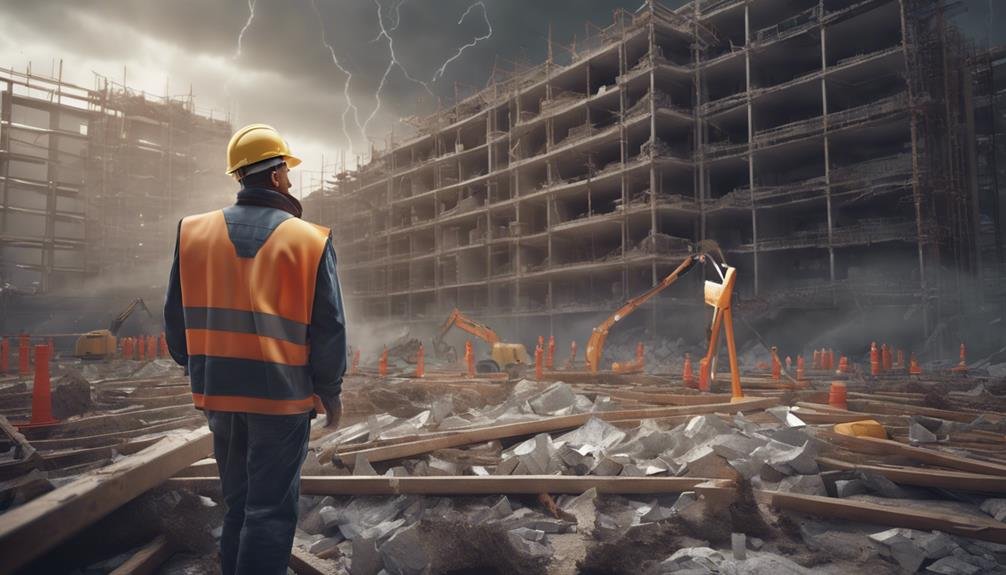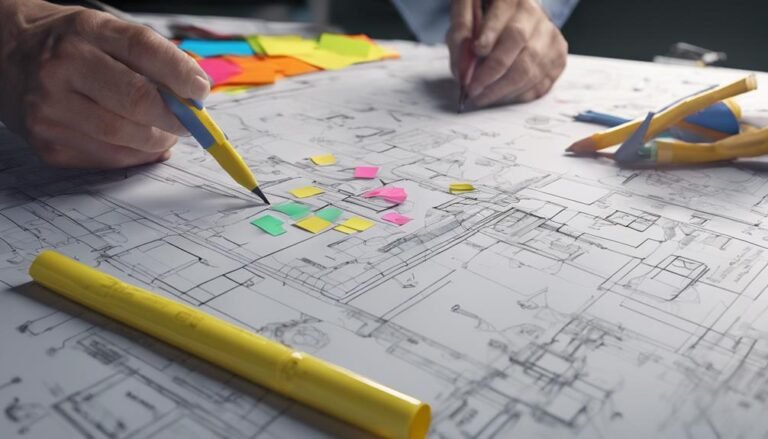Crisis Management: Leading a Construction Team Through Tough Times
When facing tough times in construction, understanding crisis triggers is crucial. Identify issues early, like budget overruns or supply disruptions, and prepare contingency plans. Proactive crisis management anticipates challenges such as bad weather or material shortages. Effective communication is key for conflict resolution and maintaining team morale. Decisive decision-making with quick action plans and clear communication channels is essential. Build team resilience through trust, adaptability, and positive reinforcement. Consider crisis simulations, team training, and maintaining morale for preparedness. Address budget challenges wisely and manage stakeholder expectations transparently. Seeking external partnerships for resilience can also be beneficial.
Key Takeaways
- Conduct thorough risk assessments to identify vulnerabilities in the construction project.
- Develop contingency plans for various crisis scenarios like budget overruns or supply disruptions.
- Establish clear communication protocols for timely information dissemination within the team.
- Conduct training sessions and drills to prepare the construction team for crisis response.
- Regularly review and update crisis management strategies to ensure effectiveness and readiness.
Understanding the Crisis
To effectively lead a construction team through tough times, it's crucial to understand the crisis they're facing from all angles. Understanding crisis triggers is crucial to preempting potential issues before they escalate. By proactively identifying possible crisis points such as budget overruns, supply chain disruptions, or regulatory changes, you can implement strategies to mitigate these risks.
Engaging in proactive crisis management involves creating contingency plans for various scenarios. Anticipating challenges like inclement weather delaying construction progress or sudden material shortages allows you to respond swiftly when these situations arise. By having predefined action steps in place, you can minimize the impact of crises on project timelines and budgets.
Furthermore, understanding the root causes of crises within the construction industry, whether they stem from internal miscommunication or external factors like economic downturns, empowers you to address underlying issues effectively. By staying vigilant and adaptive, you can navigate tough times with resilience and lead your team to success.
Effective Communication Strategies
Understanding the crisis your construction team is facing lays the foundation for implementing effective communication strategies to navigate tough times successfully. Conflict resolution plays an important role in maintaining team dynamics during challenging periods. As a leader, it's essential to address conflicts promptly and constructively to prevent them from escalating and affecting team morale. Encouraging open dialogue and active listening among team members can help resolve misunderstandings and foster a more collaborative work environment.
Effective feedback is another key component of successful communication strategies. Providing clear and specific feedback to your team members can help them understand expectations and areas for improvement. Additionally, honing your leadership skills is crucial for effectively conveying information, inspiring confidence, and maintaining team motivation during crises. Strong leadership can help unite the team behind a common goal and guide them through adversity with resilience and determination.
Decisive Decision-Making
When leading your construction team through challenging situations, the ability to make quick action plans and establish clear communication channels is essential.
Decisive decision-making guarantees that issues are addressed promptly and efficiently, keeping the team focused and productive.
Quick Action Plans
In times of crisis, implementing swift action plans is essential for leading a construction team through tough situations. Crisis response requires a proactive approach that prioritizes quick decision-making to address challenges promptly.
To enhance team resilience, establish clear protocols for rapid responses to emergencies and unexpected events. Develop contingency plans that outline specific actions to be taken in various crisis scenarios, ensuring that your team is well-prepared to navigate difficulties efficiently.
Encourage open communication channels to swiftly disseminate information and instructions when executing these action plans. By fostering a culture of readiness and agility, you equip your construction team to face adversity with confidence and adaptability.
Clear Communication Channels
Establishing streamlined communication channels within your construction team is vital for facilitating decisive decision-making during challenging circumstances. Team engagement plays a pivotal role in maintaining open lines of communication.
Encourage active participation by holding regular meetings to discuss project updates, address concerns, and gather input from team members. Utilize various communication strategies such as email updates, instant messaging for quick exchanges, and project management platforms to make sure everyone is informed promptly.
Clearly define roles and responsibilities, establish protocols for reporting issues, and encourage feedback to enhance communication effectiveness. By fostering transparent and efficient communication channels, you can improve collaboration, build trust, and make informed decisions swiftly to navigate through tough times effectively.
Building Team Resilience
To strengthen your construction team's resilience, focus on fostering trust and open communication channels among team members.
Encourage adaptability and flexibility in the face of challenges to guarantee your team can navigate tough times effectively.
Promote a positive mindset within the team to bolster morale and maintain motivation during demanding situations.
Foster Trust and Communication
With a focus on fostering trust and communication, building team resilience requires a foundation rooted in transparency and open dialogue within the construction team. Trust building and effective communication are pivotal in times of crisis. Trust must be earned through consistent actions that align with words, demonstrating reliability and integrity. Effective communication involves not only conveying information clearly but also actively listening to team members' concerns and feedback. By establishing trust and fostering open communication channels, team members feel supported and valued, leading to increased resilience in facing challenges. Encouraging a culture where team members feel safe to express themselves and share ideas contributes to a cohesive and resilient construction team.
| Trust Building | Effective Communication | Resilience Building |
|---|---|---|
| Consistent Actions | Clear Information | Support and Value |
| Reliability | Active Listening | Team Cohesion |
| Integrity | Feedback Encouragement | Adaptability |
Encourage Adaptability and Flexibility
Encouraging adaptability and flexibility within your construction team is essential for building resilience in the face of challenges. In times of crisis, implementing innovation strategies can help your team navigate uncertainties by fostering a culture that embraces change and new ideas.
Encourage team members to think outside the box, experiment with different approaches, and adapt quickly to evolving situations. Collaboration techniques such as cross-training employees in various roles can enhance flexibility within the team, ensuring that tasks can be reassigned as needed.
Promote Positive Mindset
In fostering a positive mindset within your construction team, you lay the foundation for building resilience and overcoming challenges effectively. A mindset shift is important during tough times; encourage your team to focus on solutions rather than problems.
Team motivation plays a significant role in maintaining positivity. Regularly communicate with your team, listen to their concerns, and provide encouragement to keep spirits high. Positivity reinforcement can be achieved through highlighting small wins and milestones achieved, no matter how minor.
Building resilience involves developing mental toughness and adaptability. Encourage team members to support each other, foster a sense of camaraderie, and celebrate successes together. By promoting a positive mindset, you equip your team with the tools needed to navigate through challenging situations with strength and determination.
Crisis Response Planning
When considering crisis response planning for your construction team, what key strategies should you prioritize to guarantee effective mitigation and recovery?
Crisis simulation and team training are vital elements in preparing your team for potential challenges. Conducting crisis simulations allows your team to practice responding to various scenarios, identifying gaps in processes, and refining communication channels. Through these simulations, you can evaluate the effectiveness of your current crisis response plan and make necessary adjustments.
Team training plays a significant role in ensuring that all team members understand their roles and responsibilities during a crisis. Providing regular training sessions on crisis response procedures, communication protocols, and decision-making frameworks can enhance your team's preparedness and agility in dealing with unexpected situations. Additionally, fostering a culture of continuous learning and improvement within your team can help strengthen their resilience and adaptability when facing crises.
Maintaining Morale
To maintain morale within your construction team during tough times, consider implementing team bonding activities to foster a sense of unity and collaboration.
Open communication channels can also play an important role in keeping everyone informed and engaged.
Additionally, recognizing and appreciating the efforts of your team members can go a long way in boosting morale and motivation.
Team Bonding Activities
Consider implementing regular team building exercises to boost camaraderie and maintain high spirits within your construction team during challenging times. Team building through outdoor activities can be a great way to break the routine and foster teamwork. Additionally, virtual team challenges and games offer a modern approach to bonding, especially when in-person gatherings are not possible. Below is a table highlighting some effective team bonding activities:
| Activity | Description | Benefits |
|---|---|---|
| Outdoor Scavenger Hunt | Teams compete to find items outdoors. | Encourages teamwork and problem-solving. |
| Virtual Escape Room | Solve puzzles collaboratively to "escape". | Enhances communication and critical thinking. |
| Paintball Challenge | Friendly competition in a controlled environment. | Promotes strategy and teamwork. |
| Online Trivia Night | Test knowledge and bond over fun facts. | Fosters friendly competition and camaraderie. |
Open Communication Channels
Establishing open communication channels within your construction team is crucial for maintaining morale and fostering a positive work environment during challenging times. Team motivation thrives on transparent and frequent communication.
Encourage team members to share their concerns, ideas, and feedback openly. Address conflicts promptly through active listening and constructive dialogue. Conflict resolution is vital to preventing issues from escalating and affecting team morale.
Regular team meetings and one-on-one check-ins can serve as platforms for discussions. Guarantee that all team members feel heard and valued. By promoting open communication, you create a supportive atmosphere where everyone feels empowered to contribute positively.
This approach not only boosts morale but also strengthens team cohesion during tough times.
Recognition for Efforts
Recognizing the efforts of your construction team members is essential for boosting morale and maintaining a positive work environment during challenging times. Showing genuine appreciation for their hard work can greatly impact team motivation and productivity.
Acknowledging individual and collective achievements fosters a sense of value and belonging within the team. Consider implementing a recognition system that highlights outstanding performances, such as employee of the month awards or shoutouts during team meetings.
Personalized notes of appreciation or small tokens of recognition can also go a long way in showing your team that their efforts are noticed and valued. By consistently recognizing and celebrating the hard work of your construction team, you can help uplift spirits and keep morale high even in the face of adversity.
Addressing Budget Challenges
When facing budget challenges in construction projects, prioritizing essential expenses is important for maintaining financial stability and project progress. To address financial constraints, consider implementing cost-cutting strategies that don't compromise the quality or safety of the project. Evaluate all expenditures meticulously, looking for areas where savings can be made without sacrificing the project's integrity. Encourage team collaboration to brainstorm innovative ways to reduce costs, such as renegotiating contracts or sourcing materials from more affordable suppliers.
Maintaining team motivation during budget challenges is essential for ensuring productivity and quality work despite limitations. Clearly communicate the financial constraints to your team, emphasizing the importance of everyone's contribution to overcoming these challenges. Recognize and appreciate cost-saving ideas from team members to boost morale and foster a sense of ownership in the project's success. By fostering a collaborative environment and implementing strategic cost-saving measures, you can navigate budget challenges effectively while keeping your construction team motivated and focused on achieving project goals.
Managing Stakeholder Expectations
To effectively manage stakeholder expectations in construction projects, it's essential to establish clear communication channels and set realistic goals from the outset. Building strong stakeholder relationships is important for project success. Regular updates and transparent communication help manage expectations and build trust. Conflict resolution skills play an important role in addressing any disagreements that may arise. By actively listening to stakeholders' concerns and finding mutually beneficial solutions, you can maintain positive relationships and keep the project on track.
Risk assessment is another critical aspect of managing stakeholder expectations. Identifying potential risks early on allows you to proactively plan for contingencies and communicate effectively with stakeholders about any potential disruptions. By being transparent about risks and mitigation strategies, you can instill confidence in your stakeholders and demonstrate your commitment to project success.
Learning From Past Crises
As you navigate leading a construction team through tough times, drawing insights from past crises can provide valuable lessons for improving future project resilience and decision-making. Crisis reflection is essential for understanding what worked well and what didn't in previous challenging situations. By analyzing past experiences, you can identify patterns, weaknesses, and strengths within your team's dynamics and processes. This introspection allows for targeted improvements that lead to team growth and enhanced crisis management capabilities.
Moreover, looking back at past crises enables you to develop future strategies that are more robust and proactive. By learning from mistakes and successes, you can implement changes that increase your team's ability to anticipate and effectively respond to challenges. Integrating these lessons into your project management approach equips your team with the tools needed to navigate tough times with resilience and agility. Ultimately, leveraging past experiences to inform your decisions fosters a culture of continuous improvement and adaptability within your construction team.
Seeking External Support
In times of adversity, consider seeking out external expertise and resources to bolster your construction team's capabilities and resilience. Building external partnerships can be a strategic move to enhance your team's ability to navigate tough times effectively.
- Specialized Consultancies: Engage with construction management consultancies to gain insights into industry best practices and innovative strategies for crisis management.
- Collaboration with Suppliers: Strengthen relationships with key suppliers to guarantee a stable flow of materials and resources during challenging periods.
- Government Agencies: Explore partnerships with governmental bodies to access support programs, funding opportunities, and regulatory guidance tailored to the construction sector.
- Industry Associations: Join forces with construction industry associations to tap into networking opportunities, knowledge sharing platforms, and collective advocacy efforts for resource allocation and risk mitigation.
Conclusion
As you navigate the challenges of crisis management in construction, remember that resilience and effective communication are key. Stay proactive in planning for potential crises and addressing budget challenges.
Learn from past experiences and seek external support when needed. By implementing these strategies, you can lead your construction team through tough times with confidence and success.
But remember, the true test of leadership comes when faced with unexpected obstacles – are you prepared for what lies ahead?







